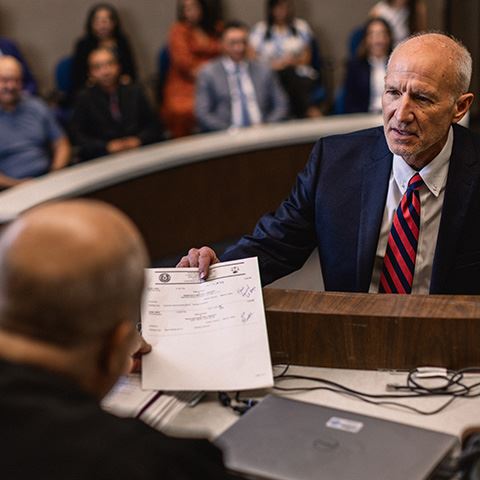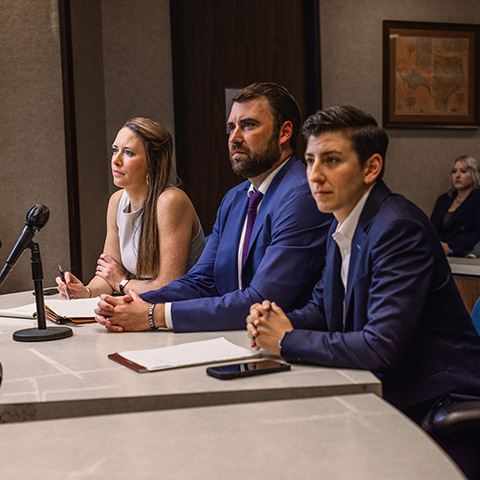Texas Brain Injury Attorneys
Traumatic brain injuries are complex incidents with potentially devastating consequences. These injuries often occur due to unexpected events such as accidents, falls, or sporting mishaps and can drastically alter the lives of victims and their families.
Hilliard Law advocates for individuals affected by brain injuries. Our team of dedicated attorneys offers legal guidance and assistance to those seeking justice in the aftermath of a brain injury. We stand ready to represent individuals in TBI cases, providing comprehensive legal support every step of the way. It's our mission to navigate the complexities of these cases, offering compassion and understanding while fighting for your rights.
Call (866) 927-3420 today to schedule a free consultation with one of our Texas brain injury lawyers.


Common Causes of Brain Injuries
Brain injuries can happen in various ways, and while it's impossible to predict every scenario that may lead to such an injury, certain factors and events commonly arise in these instances.
Some of the most frequently observed causes include:
- Motor Vehicle Accidents: Collisions involving cars, motorcycles, buses, bicycles, and pedestrians often result in traumatic brain injuries due to the impact or sudden changes in acceleration or deceleration.
- Falls: Whether from a height, such as on construction sites or from ladders, or even simple slips and falls on level surfaces, these incidents can lead to significant brain injuries.
- Sports-Related Injuries: High-impact and extreme sports are often to blame, with sports activities contributing to a substantial number of brain injuries each year.
- Violence: Instances of assault, domestic violence, or child abuse can result in severe brain injuries.
- Medical Malpractice: Errors in medical treatment, improper surgical procedures, or misdiagnosis can also be a cause of brain injury.
It's important to note that this is not an exhaustive list, as brain injuries can occur in other circumstances as well. If you or a loved one has suffered a brain injury for any reason, seeking legal advice is critical. Our team of Texas brain injury attorneys is here to help guide you.
Types of Brain Injuries
Brain injuries encompass a wide range of conditions, each with its own unique set of symptoms, severities, and long-term implications.
Here is an overview of the most commonly encountered types:
- Concussion: A concussion is a type of traumatic brain injury caused by a blow to the head or body, a fall, or another injury that jolts the brain inside the skull. While concussions are typically not life-threatening, their effects can be significant.
- Contusion: A contusion is a bruise (bleeding) on the brain resulting from a direct blow to the head. In some cases, large or severe contusions may require surgical removal.
- Coup-Contrecoup: These injuries occur when the force of an impact causes the brain to collide with the opposite side of the skull, resulting in contusions at both the site of the initial impact (coup) and on the opposite side (contrecoup).
- Diffuse Axonal Injury (DAI): This type of brain injury is caused by shaking or strong rotation of the head, such as in cases of whiplash. DAI can lead to unconsciousness or a persistent vegetative state.
- Penetrating Injury: Penetrating brain injuries occur when a foreign object pierces the skull and enters the brain. These injuries are often severe and can be life-threatening.
It is important to remember that every brain injury is unique and affects individuals differently. The impact of brain injuries can vary greatly depending on the type, location, and severity of the injury, as well as the individual's overall health prior to the injury.
Types of Compensation Available for Brain Injury Victims in Texas
Victims of brain injuries may be eligible for various forms of monetary compensation. The different types typically reflect the diverse ways in which these injuries can impact an individual's life.
The categories of compensation could include:
- Medical Expenses: This portion of compensation can cover the costs of medical treatment, therapy, medication, and any necessary medical equipment related to the brain injury.
- Rehabilitation Costs: Brain injuries often require extensive rehabilitation, which may include physical therapy, speech therapy, occupational therapy, and psychological counseling. These costs may also be factored into a compensation package.
- Lost Wages & Loss of Earning Capacity: If a brain injury has caused you to miss work or has impaired your ability to work in the future, you may be entitled to compensation for lost wages and decreased earning potential.
- Pain & Suffering: This aspect of compensation is meant to address the physical pain and mental anguish caused by a brain injury.
- Loss of Enjoyment of Life: Brain injuries can significantly impact a person's ability to enjoy life as they once did. This compensation is meant to reflect that loss.
- Punitive Damages: In situations where the party responsible for the injury acted in a particularly reckless or egregious manner, punitive damages may be awarded in addition to compensatory damages. These are intended to punish the offending party and deter similar actions in the future.
Long-Term Effects of Traumatic Brain Injuries: Guidance from Texas Brain Injury Attorneys
A traumatic brain injury (TBI) can have a wide range of long-term effects, depending on the severity of the injury, the area of the brain affected, and the individual’s overall health. Here are some of the potential long-term effects of a TBI:
Cognitive Effects
Traumatic brain injuries often result in memory problems, making it difficult to retain new information or recall past events. Individuals may also experience concentration issues, struggling to focus on tasks or maintain attention. Executive functions such as planning, organizing, and decision-making can be impaired, along with difficulties in language and communication, affecting speaking, understanding, reading, or writing.
Physical Effects
Chronic pain, particularly persistent headaches or migraines, is a common long-term physical effect of TBI. Motor skills may be compromised, leading to reduced coordination, balance issues, or difficulty with fine motor tasks. Some individuals may develop epilepsy or have recurrent seizures, and chronic fatigue can also be a significant issue.
Emotional & Behavioral Effects
Mood swings, with sudden and unexplained changes in mood, are a frequent consequence of TBI. The risk of mental health disorders, such as depression and anxiety, increases. Additionally, individuals may experience increased irritability, aggression, and difficulty controlling impulses, leading to risky behaviors.
Sensory Effects
Sensory processing issues can affect vision, hearing, taste, smell, or touch, making daily activities challenging. Many individuals with TBI develop heightened sensitivity to light and noise. These sensory disruptions can significantly impact daily living and overall comfort.
Social Effects
Maintaining personal and professional relationships can become challenging due to the social effects of TBI. Social isolation is common, as individuals may withdraw from social activities and community events. Employment challenges also arise, with difficulties in performing previous job tasks or maintaining employment.
Long-Term Health Risks
Traumatic brain injuries increase the risk of developing neurodegenerative diseases like Alzheimer's disease, Parkinson's disease, and chronic traumatic encephalopathy (CTE). Sleep disorders, including insomnia and sleep apnea, are also more prevalent among those with TBI. These long-term health risks can further complicate recovery and quality of life.
Rehabilitation & Support
Long-term rehabilitation may involve physical, occupational, and speech therapies to address the diverse effects of TBI. Psychological support, such as counseling or psychiatric care, is crucial for managing emotional and behavioral changes. Assistive devices can help with mobility, communication, and daily tasks, enhancing independence and quality of life.
Quality of Life
The long-term effects of TBI can significantly impact an individual’s quality of life, varying widely based on treatment, rehabilitation, and available support. Early and continuous intervention can help mitigate some effects and improve outcomes. A robust support network and effective medical care are essential for enhancing the quality of life for those affected by TBI.
Statute of Limitations for TX Brain Injury Cases
In Texas, the statute of limitations for personal injury cases, including brain injuries, is generally two years from the date of the injury. However, exceptions may apply in certain scenarios, such as when the injured party was a minor at the time of the incident or if the injury was not discovered until later.
Hilliard Law provides legal guidance and representation for individuals affected by TBI. Our team of dedicated attorneys stands ready to represent you, providing comprehensive legal support every step of the way. It's our mission to navigate the complexities of these cases, offering compassion and understanding while advocating for your rights.
FAQs About Brain Injury Claims in Texas
What are the symptoms of a TBI that could impact my claim?
Symptoms of a TBI vary widely but may include headaches, dizziness, memory loss, difficulty concentrating, mood swings, fatigue, nausea, and sensitivity to light or sound. In severe cases, victims may experience seizures, loss of motor function, speech difficulties, or cognitive impairment. Because symptoms may not appear immediately after an accident, please seek medical attention as soon as possible. Medical records documenting these symptoms can serve as key evidence in your legal claim.
What should I do if I suffer a brain injury in an accident in Texas?
If you suffer a brain injury in an accident, your first priority should be seeking immediate medical attention, even if symptoms seem mild. Traumatic brain injuries (TBIs) can worsen over time if left untreated. Once you have received medical care, document the accident, gather evidence, and obtain witness statements if possible. You must consult a personal injury attorney who specializes in brain injury claims to ensure you understand your rights and can pursue compensation for medical expenses, lost wages, and other damages.
How do I prove negligence in a brain injury claim?
To successfully recover compensation, you must prove that another party’s negligence caused your brain injury. This typically involves showing that the responsible party owed you a duty of care, breached that duty (e.g., through reckless driving, unsafe property conditions, or medical malpractice), and directly caused your injury. Evidence such as medical records, accident reports, expert testimony, and witness statements can be important in establishing liability.
What challenges might arise in proving a brain injury claim?
Proving a brain injury claim can be challenging because symptoms may not be visible or easily quantifiable, unlike broken bones or cuts. Insurance companies may argue that the injury is not as severe as claimed, was pre-existing, or was not caused by the accident. Proper medical documentation, expert testimony from neurologists or neuropsychologists, and detailed accounts from family, friends, and employers about how the injury has affected daily life are crucial in overcoming these challenges.
How do insurance companies typically handle brain injury claims?
Insurance companies often attempt to minimize payouts by disputing the severity of the injury, questioning liability, or offering low settlement amounts. They may argue that medical treatments are unnecessary or that symptoms are exaggerated. It is crucial to avoid accepting an early settlement without consulting an attorney, as brain injuries can have long-term effects that require ongoing medical care. Our team can negotiate on your behalf and ensure that you receive compensation that accurately reflects your needs.
How long does it take to settle a brain injury claim in Texas?
The time it takes to resolve a brain injury claim varies depending on the complexity of the case, the severity of the injury, and whether liability is disputed. Some cases settle within a few months, while others take years, especially if they go to trial. Insurance companies often try to minimize payouts, so having legal representation can help expedite negotiations and ensure you receive fair compensation. If a settlement cannot be reached, a lawsuit may be necessary, which can extend the timeline.
To schedule a free case consultation, call (866) 927-3420 or contact us online today.



Real Results ReaL Justice
-
Record-Setting$575Wrongful Death
Million Settlement*Hilliard Law attorneys represented numerous injury victims and the families of those killed in accidents caused by GM’s defective ignition switch and their concealment of safety defects.
-
$310Wrongful Death
Million VerdictHilliard Law attorneys secured a $310 million verdict against “Funtime” Handelsgesellschaft M.G.H., the manufacturer of the defective Orlando FreeFall attraction at ICON Park, for the family of Tyre Sampson.
-
$50Wrongful Death
Million SettlementIn September 2021, Hilliard Law attorneys secured a $50 Million settlement for the family of a man who died in a commercial trucking accident.
-
$33Traumatic Brain Injury
Million VerdictThe Hilliard Law trial team won a $33M product liability case against a golf-car company, involving a golf cart that tipped over on a child causing a severe traumatic brain injury.
-
$33Work Injury
Million AwardWith the representation of Hilliard Law, two delivery drivers who were shot while completing a delivery were awarded $33 million through an arbitration panel.
-
$30ATV Accident
Million VerdictA jury determined that the defective design and marketing of an All Terrain Vehicle were the proximate cause of the decedent's injuries in a fatal ATV accident.
Hilliard Law Stands Up for Victims of Traumatic Brain Injury in Texas
At Hilliard Law, we believe in fighting tirelessly for our clients. We understand the devastating consequences such injuries can bring, and we strive to advocate for your rights in a considerate and compassionate manner.
Trust is paramount in our profession, and we are committed to building it through clear communication, transparency, and respect for your journey. We draw upon a depth of experience in handling TBI cases and approach each case with a personalized strategy and thorough preparation. It's not just about legal representation; it's about standing up for victims, giving them a voice, and helping them seek justice.
Our firm is not simply representing you — we are standing with you.


It’s our mission to hold the powerful accountable for their wrongdoing. Reach out to our team immediately regarding your case to schedule a free attorney consultation today.


